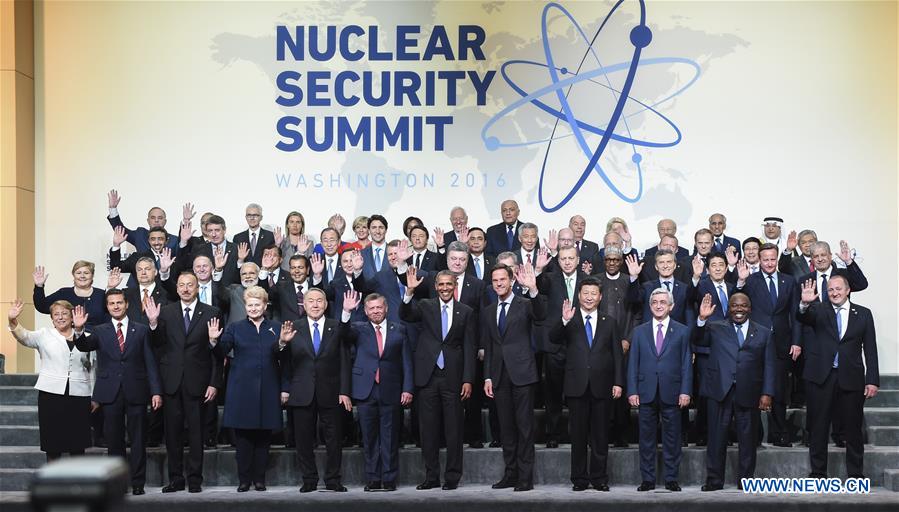Full coverage: Xi Visits Czech Republic, Attends Nuclear Security Summit
WASHINGTON, April 1 (Xinhua) -- Leaders attending the fourth Nuclear Security Summit (NSS) here Friday vowed to make continued national and international endeavors to tackle the threat of nuclear terrorism.

WASHINGTON D.C., April 1, 2016 (Xinhua) -- Chinese President Xi Jinping (4th R, front) poses for a group photo with other leaders attending the fourth Nuclear Security Summit in Washington D.C., the United States, April 1, 2016. (Xinhua/Xie Huanchi)
"The threat of nuclear and radiological terrorism remains one of the greatest challenges to international security, and the threat is constantly evolving," they pointed out in a communique, which also recognized the progress that has been achieved under the NSS process.
Under such circumstances, the leaders reaffirmed their commitment to the "shared goals of nuclear disarmament, nuclear non-proliferation and peaceful use of nuclear energy."
Meanwhile, they also stressed that measures to strengthen nuclear security "will not hamper the rights of States to develop and use nuclear energy for peaceful purposes."
In promoting nuclear security, the states bear "the fundamental responsibility ... to maintain at all times effective security of all nuclear and other radioactive material, including nuclear materials used in nuclear weapons, and nuclear facilities under their control," said the communique.
"More work remains to be done to prevent non-state actors from obtaining nuclear and other radioactive materials, which could be used for malicious purposes," it said. "We pledge that our countries will continue to make nuclear security an enduring priority."
In addition, the communique pointed out that "countering nuclear and radiological terrorism demands international cooperation" and that "international cooperation can contribute to a more inclusive, coordinated, sustainable, and robust global nuclear security architecture for the common benefit and security of all."
In that aspect, the leaders reaffirmed "the essential responsibility and the central role of the International Atomic Energy Agency (IAEA) in strengthening the global nuclear security architecture and in developing international guidance."
They also reiterated the IAEA's "leading role in facilitating and coordinating nuclear security activities among international organizations and initiatives and supporting the efforts of States to fulfill their nuclear security responsibilities."
"We seek to maintain the international network of officials and government experts who have supported the Summit process and to incorporate the broader community of States, as well as encourage the continued engagement of relevant partners in nuclear industry and civil society," said the document.
The leaders also promised to implement the five action plans attached to the communique in support of five international organizations and initiatives that "reflect the political will of participating States."
Chinese President Xi Jinping, U.S. President Barack Obama and leaders and envoys from other 50 countries and four international organizations attended the 2016 NSS, which marked the end of the six-year-old NSS process in this format.
"We affirm that the Communiques from the 2010, 2012 and 2014 Summits and the Work Plan of the 2010 Summit will continue to guide our efforts as we endeavor to fully implement them," said the latest communique.















